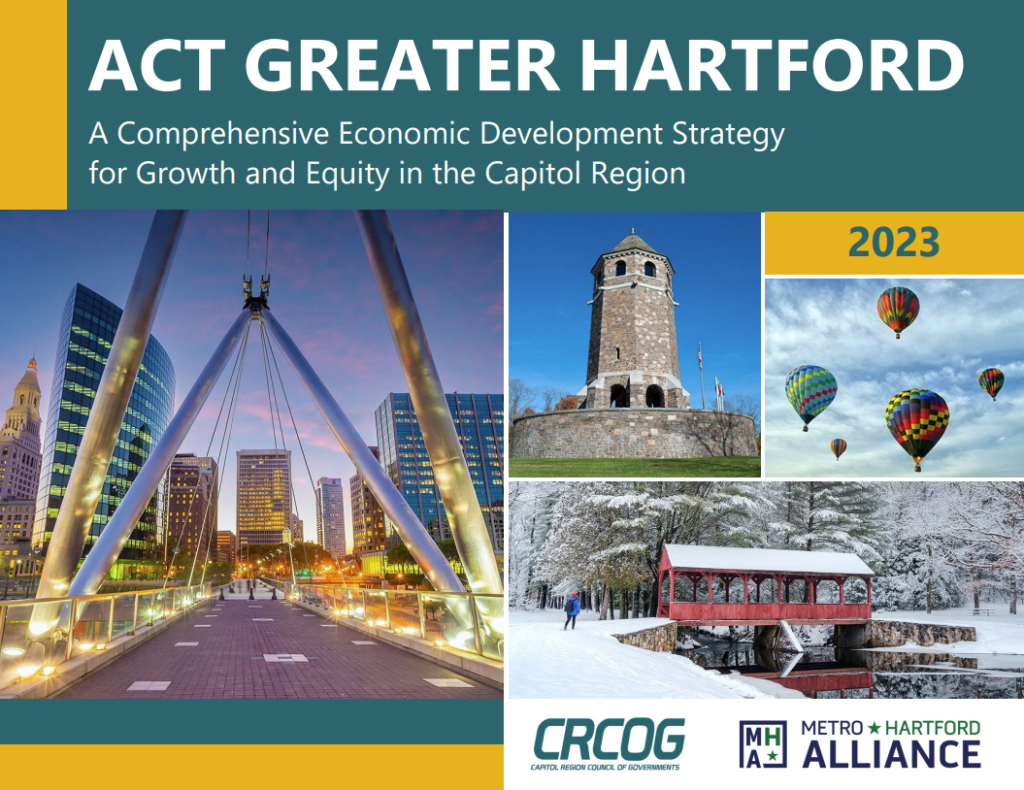Overview
The Capitol Region Council of Governments is dedicated to maintaining and enhancing the regional economy which allows the residents and businesses that call our region home to be supported and thrive. To do this CRCOG develops and updates a number of plans which can be found on this page. Through these plans accompanied by strategic programming and initiatives staff pursue 3 economic goals:
a) educate, train, and retain talent - with a focus on underserved and underrepresented populations - to better meet the needs of the region’s employers and to create jobs paying a family living wage;
b) enhance the quality of place amenities throughout our region to retain and attract talent; and
c) strengthen collaboration to support and promote the region’s industry strengths.
New
Small businesses are a vital part of our economy. A 2019 Small Business Association (SBA) Report found that small businesses accounted for 44% of U.S. economic activity. Check our Municipal and Small Business Resource Center Page!
To increase economic recovery after the COVID-19 pandemic, CRCOG launched this clearinghouse to connect municipalities, small businesses, and entrepreneurs to the resources needed to assess existing community resources, identify and mitigate vulnerabilities, and to better understand the populations and workforce in our Region's business corridors. This Municipal and Small Business Resource Center was developed using funds from the U.S. Economic Development Administration CARES Act, through the CT Department of Economic and Community Development.
Regional CEDS - "ACT GREATER HARTFORD"
Every five years, a Comprehensive Economic Development Strategy, or CEDS, is required to be prepared and updated. When CRCOG’s last CEDS plan was published in 2019, projections anticipated a period of growth, with a strong insurance and financial sector, resurgent advanced manufacturing, emerging biotech and other strengths. The COVID-19 pandemic upended the global economy in unexpected ways, forcing both governments and businesses to shift their focus to reconfigure ways for businesses operate and recruit workers, households to adjust to sudden job losses (and gains) and adapt to a new normal.
In June 2022, CRCOG began working with Camoin Associates and various partner organizations to update the CEDS for 2024-2029. We recognized recovery from the economic disaster of a pandemic required more than strategies and a plan, but also specific actions and committed partners to implement the strategies identified. ACT Greater Hartford – A Comprehensive Economic Development Strategy for Growth and Equity in the Capitol Region is the result.
SUMMARY OF CEDS GOALS & INITIATIVES
Partners
We would like to thank the following individuals and organizations for their support in the preparation of the Capital Region Comprehensive Economic Development Strategy (CEDS):
Ron Angelo, Connecticut Center for Advanced Technology
Chip Beckett, Small Business Owner
Brownfields
Brownfields are underutilized properties which are difficult to redevelop due to the presence or potential presence of hazardous substances, pollutants or contaminants. As a former manufacturing hub, the Greater Hartford region contains many such sites, including historic factories, agricultural land, former dry cleaners, former gas stations, and other stagnant properties. While there are more than half a million identified Brownfield sites in the U.S., the numbers are likely much higher.


